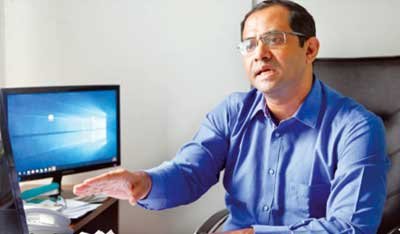Published in New Age on Friday 2 November 2018
 Bangladesh needs to standardise country-specific skills training and certification fulfilling requirements of the overseas destinations to get benefitted from skilled labour migration, Centre for Policy Dialogue research director Khondaker Golam Moazzem suggests.
Bangladesh needs to standardise country-specific skills training and certification fulfilling requirements of the overseas destinations to get benefitted from skilled labour migration, Centre for Policy Dialogue research director Khondaker Golam Moazzem suggests.
In an exclusive interview with New Age, he observed that Bangladeshi skilled workers and professionals were failing to access the global labour markets for lack of standardisation.
He says that Bangladesh has to achieve its position in the international labour markets with quality products and grooming skilled manpower.
‘For sending nurses to the European countries or Japan, the nurses should be groomed with EU or Japan standard training,’ he says, adding that the certificate accreditation is also necessary to be done by their authorised institutions for entry into their labour markets.
The CPD researcher thinks that a separate wing should be assigned to standardise the certificates for the skilled workers aspiring to migrate to overseas destinations.
‘Labour migration is a demand-driven market,’ he notes, adding that the demand from each country and even city should be explored.
He finds it deplorable that Bangladesh still remains busy with supply side without giving attention to the demand side requirement. As per the demand, workers should be made ready, he reiterates.
Khondaker Golam Moazzem observes that skills-based migration from Bangladesh has been taking place on a limited scale to Singapore, Malaysia and South Korea.
In the Middle East countries, Bangladesh sends mostly unskilled workers and small number of engineers, doctors and professors.
‘Employers in the Middle East are keen to recruit semi-skilled and skilled workers from India and Sri Lanka,’ he mentions.
Bangladesh lags behind in exploring labour markets for skilled workers and professionals mainly for branding and networking problems.
‘Bangladesh is branded as a country sending cleaners, not doctors and engineers,’ he says, adding that such image should be removed in the destination countries.
‘Foreign employers think that the prospective skilled workers are nor competent like other nationals from Sri Lanka and Philippines. Such notion should be broken down,’ he added.
He called upon the government and the Bangladesh Association of International Recruiting Agencies to make interventions with targeted investments to strengthen networking system in the countries of destinations.
Through Bangladesh missions, interventions in foreign media can be made to change image, he suggests, adding that foreign recruiting agencies should be motivated through information that skilled workers and professionals are being groomed in the country.
There is no doubt that the sending of skilled workers will boost inflow of remittances, he notes.
One skilled worker can get the wages equivalent to that of four unskilled workers, he says, adding that the Philippines send workers abroad half of what Bangladesh sends but they earn double the remittances Bangladesh earns every year.
The Philippines groomed workers with country-specific training at its province level, he said, adding that programmes should be taken on skill-based market requirements.
About technical and vocation education, Moazzem suggests that local vocational institutes should have joint venture programmes with institutes of foreign countries to get accreditations on skills certificate.
He says that technical students should be given training on spoken language along with practical classes on trades to let them become skilled workers.
About the migration cost, the CPD researcher says that there is no imminent possibility of reduction in the cost of migration as it was mainly dependent on demand and supply.
As there is lack of jobs inside the country, many workers are trying to go abroad paying competitively increasing money, he points out.
He, however, says that transactions of cost should be made transparent to help cut the cost.
Moazzem states that the government to government negotiation should focus on increasing wages of the migrants at destinations to adjust cost of migration.
Asked about quality vs quantity, he says that once the philosophy of sending workers abroad was poverty reductions through employment generations. ‘Now the situation has changed and skills upgrade is needed,’ he says, adding that time has come to blend the number with quality.


